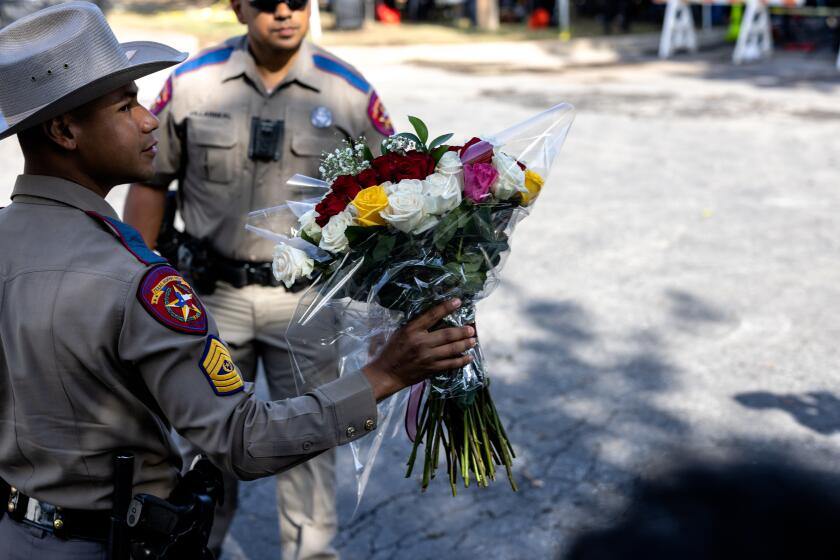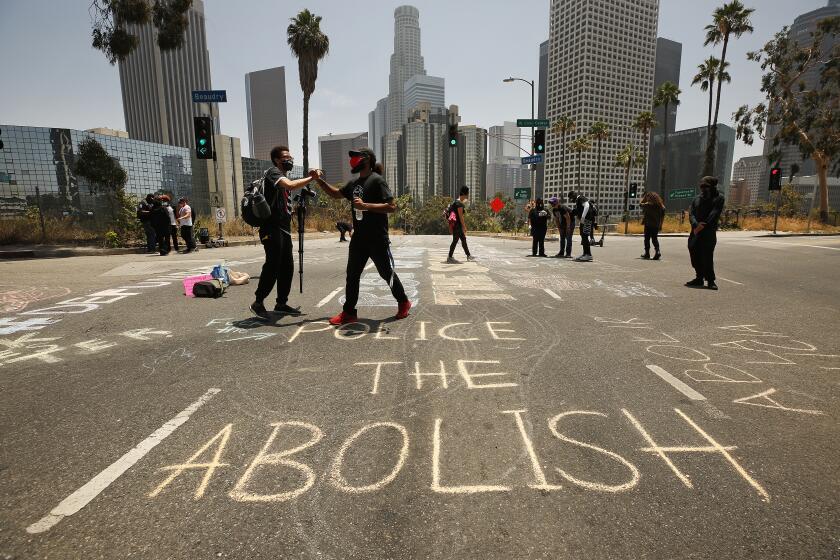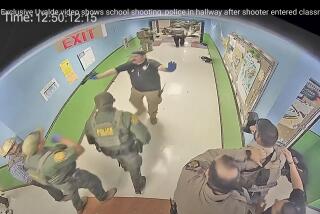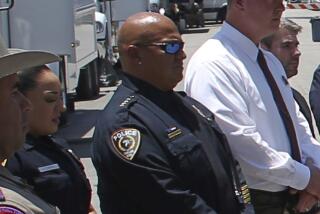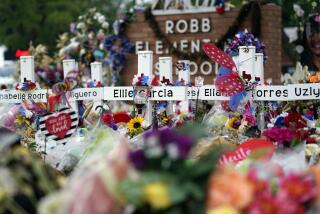Editorial: What Uvalde teaches us about policing in America
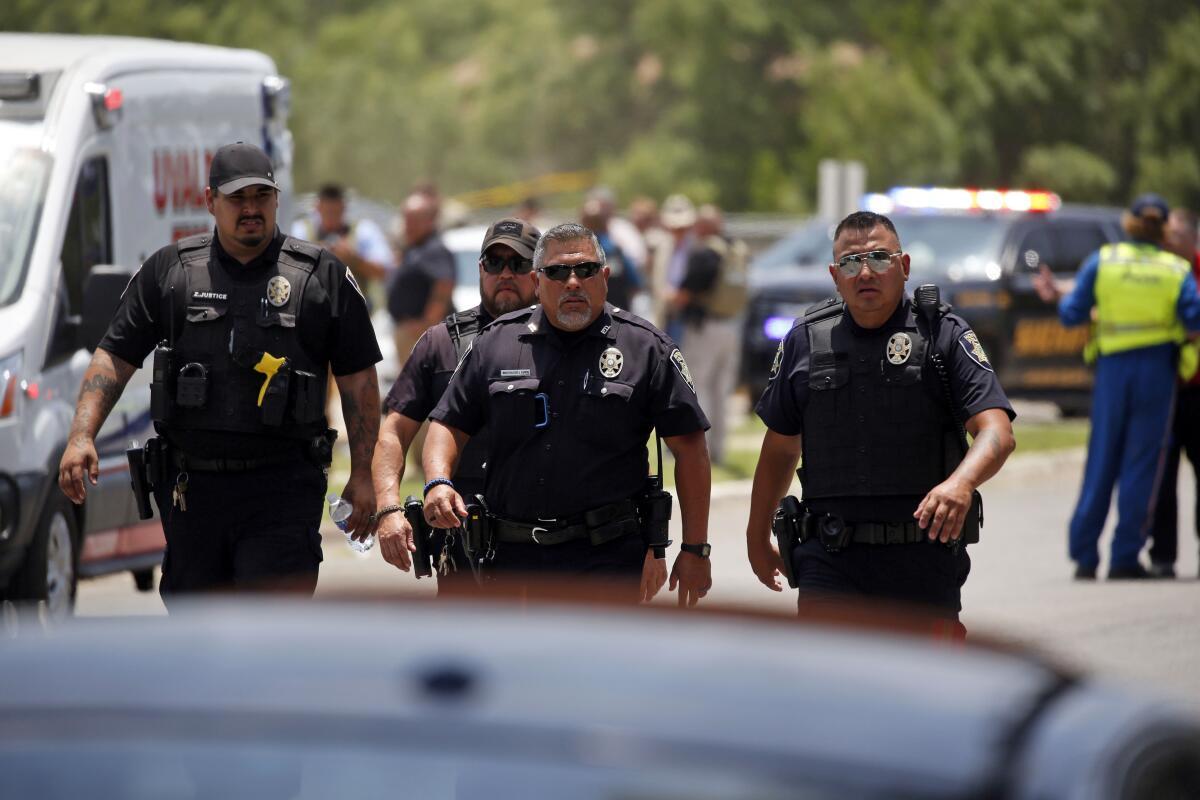
- Share via
Americans maintain a bargain with their police: Officers will run toward danger while the rest of us seek shelter, and in exchange we cede to police enormous discretion, abundant resources and the benefit of the doubt regarding their actions. That bargain is too rarely examined absent a shocking and deadly incident. The police murder of George Floyd was one such breakdown. The killing of 19 elementary school students and two adults on May 24 in Uvalde, Texas, is another.
By any measure, the law enforcement response during the approximately 80 minutes of horrific slaughter at Robb Elementary School was a shameful, abysmal failure. Official accounts of what happened, and when, have repeatedly shifted. But following reviews of audio and video recordings, it’s evident that police waited outside classrooms for more than an hour as the shooting continued inside; during that time local police blocked federal agents from entering the school (federal tactical officers ultimately entered and killed the suspect); terrified students called 911 from inside their classrooms and pleaded for police to enter, to no avail; police outside the school threatened desperate parents with arrest to keep them from entering to rescue their children when the officers would not; and school police and city police communicated poorly, adding to confusion and delay.
There were reports that Uvalde police officers entered the school to retrieve their own children, but it’s not yet clear whether that happened while the shooting was in progress or after it was over.
The lessons we can learn from the Uvalde catastrophe are many, varied and in some cases contradictory, and will be the subject of some contention. Police abolitionists argue, for example, that the deadly failure demonstrates that police don’t actually protect us, so why continue to fund them?
Left unanswered, always, is the question of who would respond, and how in the absence of an armed and trained police force the next time a killer opens fire on a school, a church, a theater, a shopping mall or a hospital.
Perhaps it’s the fate of the United States to watch its soul die along with the 19 students and two adults shot to death Tuesday at an elementary school in Uvalde, Texas.
Likewise, the law enforcement establishment seems to still be grappling with what lesson Uvalde should teach us. There have been some efforts to close ranks around the 19 officers from multiple agencies on the scene as police doing their best while under fire. But there have also been hints of efforts to describe the outrageous failures at Uvalde as an aberration, isolated to a small force. In Tulsa, Okla., following yet another mass shooting, this time at a hospital, on Wednesday, officials were careful to note that local police officers made a quick response, without hesitation. In that case the assailant was already dead by the time police reached him.
Similarly, following the killing of Floyd in Minneapolis two years ago, many law enforcement leaders around the nation separated themselves from Derek Chauvin, the officer convicted of murder in that case. Chauvin was a shameful outlier who unfairly makes the police look bad, many law enforcement officials and union leaders said.
But there have been numerous other horrific and needless police killings not caught on video, or deemed justified because review boards, judges or juries were bound by laws absolving officers of liability if other officers might have acted similarly in those circumstances. That’s the “objectively reasonable” standard of officer conduct at work, as enunciated by the Supreme Court in 1989.
Through their testimony as expert witnesses in use-of-force cases, and in their daily work, police in effect write their own standards of conduct and decide among themselves what the rest of us must accept.
If Uvalde is framed as an outlier or an aberration, it leaves open the suggestion that other police departments would have responded better and more effectively — and that what Uvalde needs now are more officers and a bigger budget.
But the fact is, even police agencies that are ostensibly better skilled and led haven’t slowed the pace of mass killings around the nation. As for increases in crime generally, police argue that they are not ineffective, but that they haven’t been given enough discretion, resources or respect.
One response to George Floyd’s death was rejection of police reform, which, opponents argued, only perpetuates a racist system. Still, reform is needed.
Do police need deference? Some, no doubt. There will always be only a few people who want to make their living running toward gunfire and putting their lives on the line. And let’s remember that the greatest danger the police confront is the result of the huge number of guns Americans have allowed on the streets. And much of the police behavior that we find reprehensible, including humiliating searches without probable cause, is conducted to find and eliminate those guns.
But we have largely given police unwarranted veto power over attempts to recraft or even reexamine our bargain. Police union donations dominate many local and congressional elections, and police opposition has stymied efforts to set minimum national standards for tactics and training — of the type that might have come in handy in Uvalde — as well as for hiring, use of force, elimination of bias and other measures of performance that should be set by society as a whole, not solely by police and the officials they put into office.
Following the Floyd murder, the House of Representatives twice passed the George Floyd Justice in Policing Act, which contained a host of very modest reforms and standards, including a database of fired officers so that they would not be rehired by other agencies, and limits to qualified immunity, a court doctrine that bars lawsuits against officers for misfeasance or nonfeasance. (The doctrine likely protects Uvalde officers from consequences for their failure to act and for threatening Robb parents with arrest while their children were being slaughtered.) But police interests strongly opposed it, and the Senate rejected it.
The day after the Uvalde shooting, on the anniversary of the Floyd murder, President Biden signed an executive order that adopts some of the measures that the Senate would not. It is an important but exceedingly small step toward remaking society’s bargain with police.
We need police. We also need to question what we demand of police and the power we give them. We cannot turn away from tragic results in Uvalde and in Minneapolis and in the countless other cities and communities in which Americans are insufficiently protected and improperly served.
More to Read
A cure for the common opinion
Get thought-provoking perspectives with our weekly newsletter.
You may occasionally receive promotional content from the Los Angeles Times.
